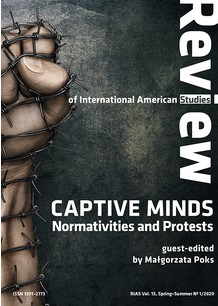A Literary History of Mental Captivity in the United States - Blood Meridian, Wise Blood, and Contemporary Political Discourse
A Literary History of Mental Captivity in the United States - Blood Meridian, Wise Blood, and Contemporary Political Discourse
Author(s): Manuel Broncano RodríguezSubject(s): Political history, Comparative Study of Literature, International relations/trade, Theory of Literature, American Literature
Published by: Wydawnictwo Uniwersytetu Śląskiego
Keywords: Cormac McCarthy; Blood Meridian; U.S. foreign policy; President Trump; President Putin;
Summary/Abstract: On July 15, 2018, U.S. President Donald Trump and Russia’s President Vladimir Putin held a summit in Helsinki that immediately set off a chain reaction throughout the world. By now, barely two months later, that summit is all but forgotten for the most part, superseded by the frantic train of events and the subsequent bombardment from the media that have become the “new normal.” While the iron secrecy surrounding the conversation between the two dignitaries allowed for all kinds of speculation, the image of President Trump bowing to his Russian counterpart (indeed a treasure trove for semioticians) became for many observers in the U.S. and across the world the living proof of Mr. Trump´s subservient allegiance to Mr. Putin and his obscure designs. Even some of the most recalcitrant GOPs vented quite publicly their disgust at the sight of a president paying evident homage to the archenemy of the United States, as Vercingetorix kneeled down before Julius Cesar in recognition of the Gaul’s surrender to the might of the Roman Empire. For some arcane reason, the whole episode of the Helsinki summit brought to my mind, as in a vivid déjà vu, Cormac McCarthy´s novel Blood Meridian and more specifically, the characters of Judge Holden and the idiotic freak who becomes Holden´s ludicrous disciple in the wastelands of Arizona. In my essay, I provide some possible explanations as to why I came to blend these two unrelated episodes into a single continuum. In the process, I briefly revisit some key texts in the American canon that fully belong in the history of “mental captivity” in the United States, yet to be written. Obviously, I am not in hopes of deciphering the ultimate reasons for current U.S. foreign policy, and the more modest aim of my article is to offer some insights into the general theme of mental captivity through a novel and a textual tradition overpopulated with “captive minds.”
Journal: Review of International American Studies
- Issue Year: 13/2020
- Issue No: 1
- Page Range: 75-98
- Page Count: 24
- Language: English

